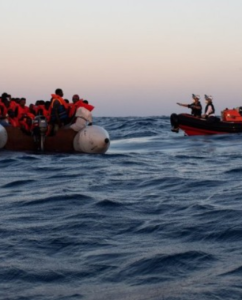A decade of migrant sea rescues
The recent death of up to 70 migrants in a shipwreck off the coast of Tobruk, Libya, has highlighted the tragic history of perilous sea crossings in the Mediterranean.
This latest tragedy is a stark reminder of the deadly risks people are forced to take in search of safety and opportunity.
Libya remains a major transit point for migrants and refugees, many of whom face exploitation, abuse, and life-threatening journeys.
Tragic scenarios such as this have been playing out regularity in the central Mediterranean, between North Africa and Italy.
 The deaths have become almost routine with little news coverage and even dramatic high sea rescues often fail to make the media.
The deaths have become almost routine with little news coverage and even dramatic high sea rescues often fail to make the media.
This year marks a milestone in that it’s the 10th anniversary of the launch of Europe’s civil fleet – a collection of about 20 boats of various sizes and a couple of airplanes run by NGOs and crewed by volunteers.
The ad hoc network of organisations and their flotilla came together in the aftermath of two shipwrecks off the Libyan coast in April 2015 that saw 1,200 people drown.
Since then, the civil fleet has rescued more than 175,000 people.
But over the same period, more than 22,000 people have died or gone missing attempting to cross the central Mediterranean.
This is just the recorded number, with the true death toll probably significantly higher.
A decade on, the rescues and the deaths continue.
The NGOs, which include United4Rescue, Sea-Watch and Sea-Eye, say the flotilla existence came from European nations’ anti-migrant policies that contribute to the deaths at sea.
They say the policies perpetuate a brutal cycle of migration detention and abuse, and that rescues at sea should be carried out by states.
The NGOs argue that since 2015, European countries have ignored that responsibility while also providing support to the Libyan Coast guard to intercept boats leaving for Europe.
The NGOs advocacy about the EU’s migration policies has attracted criticism amid Europe’s febrile political debate around migration.
And, with the rise of right-wing governments in Europe, public hostility towards the flotilla is also on the rise.
Recently, Germany, which had previously provided funding to rescue organisations, ended that support.
The move meant the loss of two million euros, intended to support around a dozen rescue missions over the next 12 months.
For its supporters, the flotilla is a symbol of all that is good about humanitarianism, but right-wing activists refer to it as ‘taxi service’ for migrants.
The NGOs says that as the EU strives to shut the flow of migrants, they are facing non-cooperation, obstruction, and sometimes criminalisation.
The UN migration agency IOM has called for enhanced regional cooperation to expand access to safe, regular, and dignified migration pathways.
It has also stressed the importance of intensifying efforts to combat trafficking in persons and migrant smuggling.












